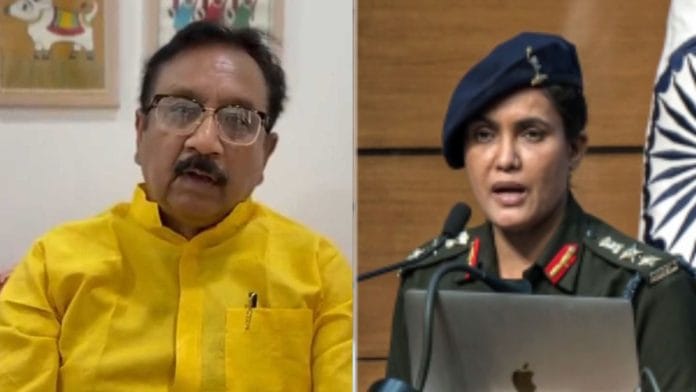Madhya Pradesh minister Kunwar Vijay Shah’s comments on Colonel Sofiya Qureshi weren’t just offensive—they were revealing. They reveal a mindset that can’t see dignity without first asking about identity. A mindset that fails to see beyond an individual’s religious identity.
The minister went so far as to call Colonel Qureshi the “sister of terrorists.” A serving Indian Army officer—who stood before the nation representing strength, professionalism, and unity—was reduced, in one sentence, to her last name. The seriousness of it wasn’t lost. The Madhya Pradesh High Court took suo motu cognisance of the statement and directed the police to file an FIR. The Supreme Court too advised the minister to be held responsible and asked him to “go and apologise to the High Court”.
While much of the country has rightly condemned the statement, it’s important to ask a question: How does someone in a position of power feel comfortable saying something like this in the first place? Shah isn’t the first politician to make such derogatory remarks. The problem goes deeper.
There is no real expectation anymore that politicians should speak with responsibility. Neither society demands better, nor do political parties enforce any boundaries. It’s about grabbing attention, owning the headlines, and calculating what will win them votes—not what’s right. We’ve reached a point where even basic decency seems optional. If political parties are serious about protecting public discourse, they need to set some clear lines—what is acceptable, and what breaches the boundary. And more importantly, what are the consequences when it does.
Yes, the minister apologised. And BJP’s Madhya Pradesh chief VD Sharma said he was “immediately warned.” But beyond that, there’s silence. No mention of Shah’s suspension, no accountability—just the usual playbook of damage control. It feels less like taking responsibility and more like trying to move on. And that in itself is telling.
A reminder
But there is one more thing that struck me: the minister belongs to the Scheduled Tribes—communities that have faced generations of discrimination. And yet, he used the same language of bigotry and suspicion against someone else, based entirely on her identity. It’s a reminder of how powerful the dominant narrative can be. Even those who have themselves been pushed to the margins can sometimes internalise the very divisions that once worked against them. And that’s not just tragic—it’s dangerous. Because when those who’ve felt exclusion start to mirror it, we lose hope of any solidarity between marginalised voices.
Remarks like these also reveal something more troubling—the kind of mindset even representatives of people can carry. To reduce someone entirely to their identity, to casually associate them with terror because of their Muslim Identity, shows how deep this thinking runs. And the truth is, we shouldn’t act surprised. Derogatory generalisations about Muslims have, over time, not only become common—they’ve become fashionable. We see it during prime time debates, and hear it from social media influencers and people with education and platforms. The idea that every Muslim who follows Islam is somehow part of a violent ideology is pushed so often, so casually, that it no longer shocks anyone.
So when outrage erupted over what was said about Colonel Qureshi, we have to ask—what exactly are we outraged about? The comment was offensive, yes. But the mindset behind it? That’s been allowed to grow for years, unchecked. And until we learn how to talk about issues—any issue—without turning an entire community into a target, these moments will keep happening.
But there’s also something we, as Muslims, need to reflect on. We often don’t take enough charge of the conversation—don’t create enough space to discuss difficult issues within our own communities. And in that silence, others step in and define us in the worst possible ways. The danger of not speaking is that it leaves the ground open for generalisations to grow.
This doesn’t mean taking responsibility for how others choose to hate—but it does mean recognising that if we don’t lead the conversation, we’ll always be the ones reacting to it. And somewhere, the cost of that is paid in how people like Colonel Qureshi are spoken about—not as individuals, not for their service, but through the lens of someone else’s prejudice.
Also read: After Operation Sindoor, let’s choose truth over TV theatre. It’s more patriotic
Inclusive by effort
While this controversy exposed deep bigotry, the response to it also reminded us that there is more hope than despair. The outrage wasn’t limited to any one side. Even within the BJP, there were voices distancing themselves from the remark.
This is still a country where Colonel Qureshi leads with honour, where President Droupadi Murmu, an Adivasi woman, holds the highest constitutional post, where Justice BR Gavai becomes the first Buddhist and second Dalit Chief Justice of India, and where our Air Force is led by Air Chief Marshal Amar Preet Singh, a proud Sikh officer. This is India. Messy, diverse, never perfect—but big enough to include everyone.
And that kind of India doesn’t just sustain itself. It has to be defended. It has to be worked for—constantly. Not just against the violence of terror, but also against the quieter damage done by prejudice, generalisation, and casual hate. Because the idea of India is inclusive—not by default, but by effort.
Amana Begam Ansari is a columnist, writer, TV news panelist. She runs a weekly YouTube show called ‘India This Week by Amana and Khalid’. She tweets @Amana_Ansari. Views are personal.
(Edited by Aamaan Alam Khan)






